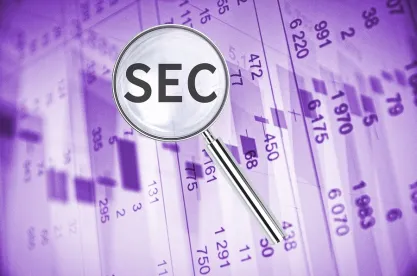Highlights
The U.S. Supreme Court held that an SEC disgorgement award that does not exceed a wrongdoer’s “net profits” is permissible equitable relief under Section 21(d)(5) of the Exchange Act. The Court did not, however, decide what type of expenses should be excluded from a calculation of a wrongdoer’s “net profits”. The Court also did not provide further guidance on the appropriate statute of limitations applicable to other types of relief in SEC enforcement actions
On June 22, 2020, the U.S. Supreme Court confirmed that the U.S. Securities and Exchange Commission (SEC) may seek disgorgement in civil enforcement actions brought in federal district court.
In Liu v. Securities and Exchange Commission, the Supreme Court considered “whether, and to what extent, the SEC may seek ‘disgorgement’ in the first instance through its power to award ‘equitable relief’” under Section 21(d)(5) of the Securities Exchange Act. The Court held that the SEC was authorized to seek disgorgement under the Act, but only insofar as it was limited to the “net profits” from a defendant’s wrongdoing.
The Ninth Circuit’s Decision
Liu arose from an SEC enforcement action related to the federal government’s EB-5 Immigrant Investor Program. The defendants raised $27 million through the program to build and operate a proton therapy cancer treatment center in California, but instead of using the money raised from investors for that purpose they used it to pay themselves millions of dollars in “salary,” among other unauthorized expenses. The SEC sued the defendants for violations of the anti-fraud provisions of the Securities Act and Securities Exchange Act, seeking not only the amount of ill-gotten gains garnered from the defendants’ fraud, but also what defendants argued were “legitimate business expenses” they had incurred running their business.
On appeal to the U.S. Court of Appeals for the Ninth Circuit, the defendants argued that “[t]he federal courts are without power to award penalties absent explicit congressional authority . . . . To the extent the district court intended to grant [the SEC] . . . disgorgement as an equitable remedy, the court erred because in fact it awarded disgorgement also as a penalty.” More specifically, the defendants argued “that the district court’s order that they disgorge . . . the total amount they raised from their investors . . . less the amount left over and available to be returned . . . was erroneous.”
Citing the Supreme Court’s 2017 decision in Kokesh v. Securities and Exchange Commission, the defendants reasoned that, in refusing to deduct their “legitimate business expenses” from the total disgorgement award, the district court ignored the well-settled definition of disgorgement as “a reasonable approximation of profits causally connected to the violation.”
The Ninth Circuit rejected the defendants’ arguments and instead relied on a prior Ninth Circuit case, Securities and Exchange Commission v. JT Wallenbrock & Associates, to support its holding that “the proper amount of disgorgement in a scheme such as this one is the entire amount raised less the money paid back to the investors.” The court also rejected the defendants’ more general claim that the district court lacked authority to impose disgorgement at all, insofar as disgorgement served as a penalty rather than an equitable remedy.
The Supreme Court’s Decision
As noted above, the Supreme Court limited its consideration in Liu to the question of “whether, and to what extent, the SEC may seek ‘disgorgement’ . . . through its power to award ‘equitable relief’” under the Securities Exchange Act. As a result, the Court’s holding was limited as well. The Court decided only that “a disgorgement award that does not exceed a wrongdoer’s net profits and is awarded for victims is equitable relief permissible under” Section 21(d)(5). In reaching this conclusion the Court relied on the historic definition of disgorgement under the common law, namely, that while equity courts had commonly imposed disgorgement to “deprive[] wrongdoers of their net profits from unlawful activity,” courts also “consistently restricted awards to net profits from wrongdoing after deducting legitimate expenses. Such remedies, when assessed against only culpable actors and for victims, fall comfortably within those categories of relief that were typically available in equity.”
But the Court did not go further to rule on the more specific arguments raised by the parties, including whether the petitioners’ “disgorgement award [was] unlawful because it fail[ed] to return funds to victims” of the petitioners’ fraud, and because it did not “deduct business expenses from the award.” “Because the parties focused on the broad question [of] whether any form of disgorgement may be ordered,” the Court said, “and did not fully brief these narrower questions, we do not decide them here.”
Conclusion
Although Liu confirmed that a disgorgement award that “does not exceed a wrongdoer’s net profits” is permissible under the Exchange Act, it failed to resolve a more important question that would have made the decision more meaningful: In what specific circumstances does an SEC disgorgement award “exceed a wrongdoer’s net profits” and become an impermissible penalty?
Further, like Kokesh, Liu also left unanswered questions about the proper scope of injunctive relief in SEC enforcement actions, specifically, whether that relief is subject to a five-year statute of limitations like other SEC remedies. By failing to address these questions, which come up regularly in SEC enforcement cases, the Court missed its opportunity to finish the job it began in its earlier decisions, and to provide definitive guidance for lower courts and litigants about the proper lifespan of SEC enforcement actions.





 />i
/>i


